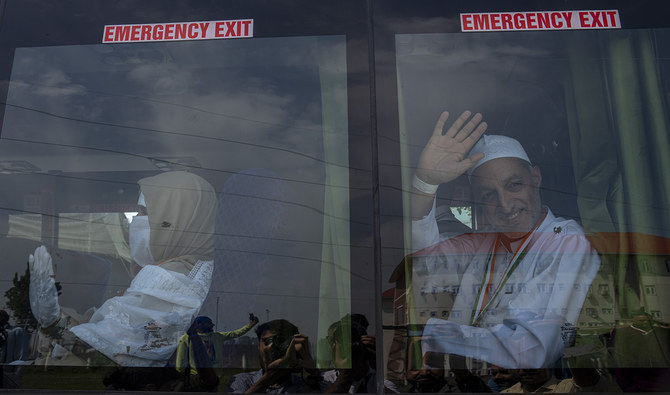NEW DELHI: The first batch of 630 pilgrims from Indian-administered Kashmir performing Hajj this year left for Saudi Arabia on Wednesday from Srinagar airport, an official from the region’s Hajj authority said.
Out of India’s annual Hajj quota of 1,75,025 pilgrims, 12,000 will be departing from the Himalayan region, nearly double Kashmir’s Hajj contingent last year and the region’s largest-ever group embarking on the spiritual journey that is one of the five pillars of Islam.
Special Hajj flights from India started in the last week of May.
“We have the highest quota this year,” Safina Baig, chairperson of the Jammu and Kashmir Haj Committee, told Arab News after 630 pilgrims departed for Jeddah from Kashmir’s main airport in Srinagar.
“It was an emotional scene with many feeling overwhelmed by the opportunity to perform Hajj in their lifetime.”
Most pilgrims were selected through a draw, except for the elderly and women traveling without a mahram, or male guardian.
“Generally, the selection process happens through draw but as a special gesture we are allowing single women and people above 70 to apply directly without going through the process of draw,” Baig said.
Special arrangements had been made by the Indian government for women traveling without a mahram, she said, including separate accommodation and women helpers.
“By Allah’s grace, I got the opportunity to travel alone to perform Hajj,” said Shamima Akhter, 56, a widow from the southern Pulwama district of Kashmir, who is among 120 Kashmiri women pilgrims traveling to Saudi Arabia alone.
“This is a good decision to allow single women to travel.”
Akhter’s three daughters helped her raise about $5,000 to pay for her Hajj package, which is around $1,000 more expensive for Kashmir compared with other regions of India.
Baig said she had raised the issue of the higher cost with the Ministry of Minority Affairs and the Haj Committee of India.
“What I understand is that the rise in the total expenses is due to higher prices of air fare from Kashmir,” she said.
“Kashmir is a Muslim majority region, and the government should be more considerate … I feel that the government should provide some relief to the Kashmiri Hajis. It sends a good message.”












